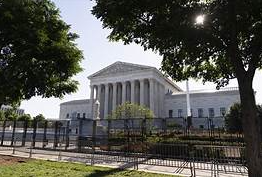A court’s barring of Trump from running for president is the culmination of America’s dysfunctional reliance on the legal system
The Colorado Supreme Court’s decision on December 19 to bar former President Donald Trump from appearing on the state’s Republican presidential primary ballot shocked many, but it shouldn’t have come as a surprise. This ruling, likely to be overturned by the U.S. Supreme Court, marks the culmination of a broader trend that has been building in the U.S. for decades: the shift of political conflicts, which once were resolved through dialogue or compromise, into the courtroom. What once would have been addressed in the political arena or through social consensus now often ends up in the legal system, as the nation faces ever-widening divides. Courts and congressional hearings have become the final refuge where Americans seek resolutions for increasingly entrenched political and social conflicts.
This reliance on the courts likely began in earnest with the bitter 1987 confirmation battle over President Ronald Reagan’s nomination of Robert Bork to the Supreme Court. Bork, a highly qualified but staunchly conservative judge, was vilified by liberals, and his confirmation was blocked. Reagan’s subsequent nomination of Douglas H. Ginsburg was derailed when Ginsburg’s youthful marijuana use was exposed. Then, in 1991, Clarence Thomas faced unsuccessful attempts to prevent his Supreme Court appointment after sexual harassment allegations by Anita Hill.
The controversy surrounding Bork, though heated, was rooted in ideological differences. But the attacks on Ginsburg and Thomas escalated the political and personal stakes, leading to deeper divisions in the public’s view of the judicial system. The impeachment of President Bill Clinton in 1998, spurred by his lies under oath about his affair with Monica Lewinsky, further eroded trust in the political process. Since then, the U.S. has found itself entangled in a series of legal battles and investigations, with special prosecutors and other figures increasingly holding sway over the nation’s fate.
This shift from political negotiation to legal battles has had significant consequences. Rather than resolving conflicts through traditional political means, both parties now seem to view the courts as the final arbiter in the battle for power. Trump’s case is the latest example of how the American political system, unable to overcome its deep divisions, turns to legal avenues for resolution, effectively turning lawfare into a new form of political warfare. As a result, the courts have become a battleground where American democracy is increasingly tested, with consequences that extend far beyond the individuals involved.

